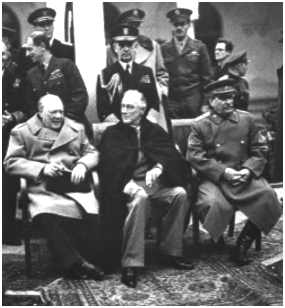And Churchill at Yalta
(In the Driveway)

Do I scream? Of course I scream. I'm screaming my mother's name before I even get out of the car; I'm screaming things I would be embarrassed to hear other people scream. I scream, "Please don't die," and "Jesus, oh, fucking Jesus." I don't even turn the car off; I just slam it in park and run to where my mother is stretched out on the driveway. I am ashamed to say that once I get to my mother, I am already thinking of her as my dead mother, my poor dead mother, and I am her loving, bereaved son, and what in the fuck am I going to do now? I'm even more ashamed to say that I examine her the way a coroner might examine a corpse. The first thing I notice is that my mother is wearing madras shorts, and how small and withered her legs are, like wilted albino green beans. Then I notice how strong and knotty her arms are from manning her wheelchair. Then I see that my mother's head is turned in my direction, and she is looking at me: not smiling at me, not laughing at me, not pleading with me, simply staring at me placidly as if to say, Help me up, please.
"Help me up, please." my mother says.
I help her up, back into her wheelchair, help her brush the gravel and dirt off her strong arms, her withered legs. By this point, my father --- who was inside shaving during all of this --- is outside, flecks of shaving cream still on his ears and neck. I tell him what has happened.
"Don't overreact, Lamar," my mother says to my father. She reminds him of the new medicine she's on, and how the doctor said it might cause momentary blackouts, like the one that my mother has just had.
"There's nothing wrong with me that wasn't wrong with me before," my mother says. She has her hands on the wheels of her chair and makes ready to go back into the house. My mother has a reunion to run, after all. But my father is holding the handles of the wheelchair, and he isn't letting my mother go anywhere. In this way, right in the driveway, my mother, father, and myself hold a conference. Picture Roosevelt, Churchill, and Stalin convening in Yalta. Yes, it is the morning of the conference and it is hot, visible waves of heat hovering and dancing over the valley. Roosevelt has just fallen out of his wheelchair and doesn't want to talk about it. Churchill and Stalin are wiping their brows, and delicately, very delicately reminding Roosevelt to attend to his considerable physical limitations.
"I am fine," my mother says, twisting and shifting in her wheelchair. "Don't worry about a thing."
"Just don't push yourself," my father says.
"He's right," I say. "You just blacked out, remember. You were lying on the driveway like you were dead. You have to take it easy."
"Why do I have to take it easy?"
"What's that?"
"Why do I have to take it easy?"
"Because you're sick."
"That's right," my mother says. "I am so sick that I am in a wheelchair. And no matter what, I'll be in a wheelchair tomorrow. Or maybe I'll feel so bad that I'll have to get out of my wheelchair and into bed. And the next day or the day after I'll feel better enough, just enough, to be able to get back in this thing again." She pounds on the wheelchair arms. "So why should I take it easy?"
"Because."
'Because why? Because it will make you feel better?" "Yes." After all, this is the truth: my mother taking it easy will make me feel better. Whether it makes her feel better is nearly incidental. I am about to say this when my father steps in.
"All right, then," he says, acting as the mediator. He is definitely Churchill, intervening and putting a stop to the debate before Stalin and Roosevelt start speaking other truths.
Stalin throws up his hands, turns his back on Roosevelt, and goes to find some vodka.
Brock Clarke
©2001 Harcourt, Inc.